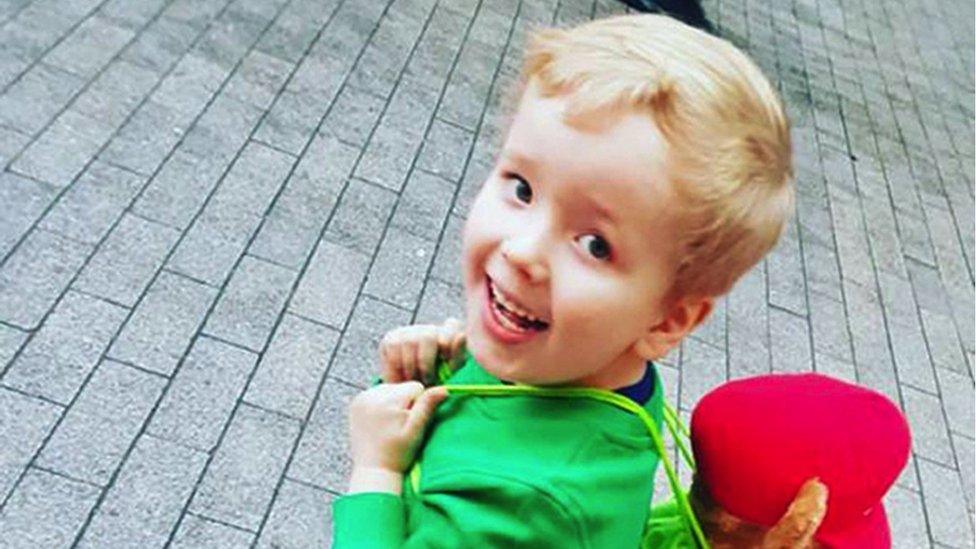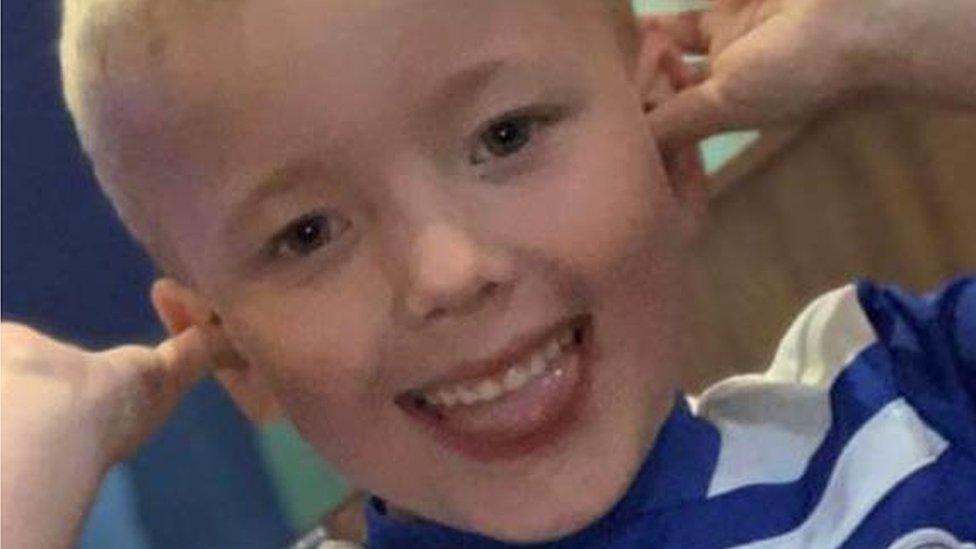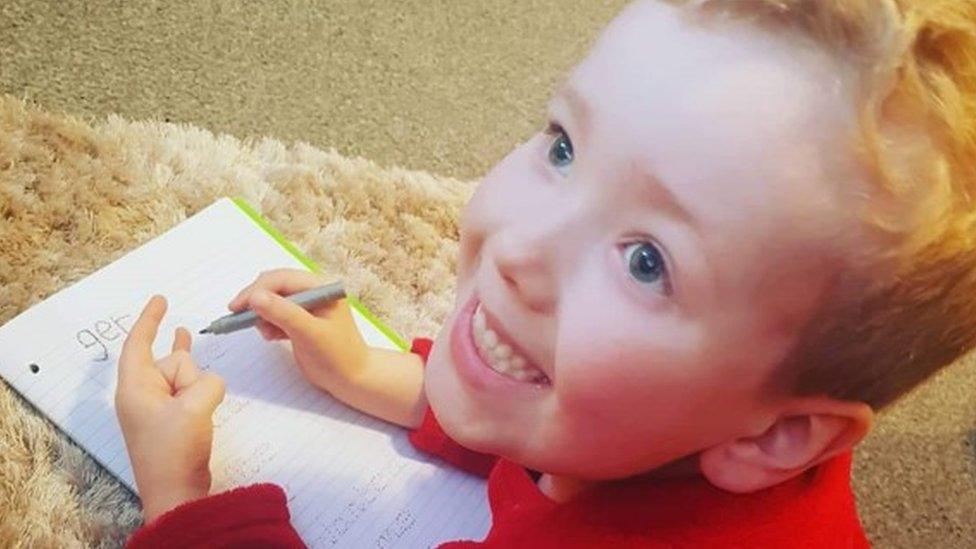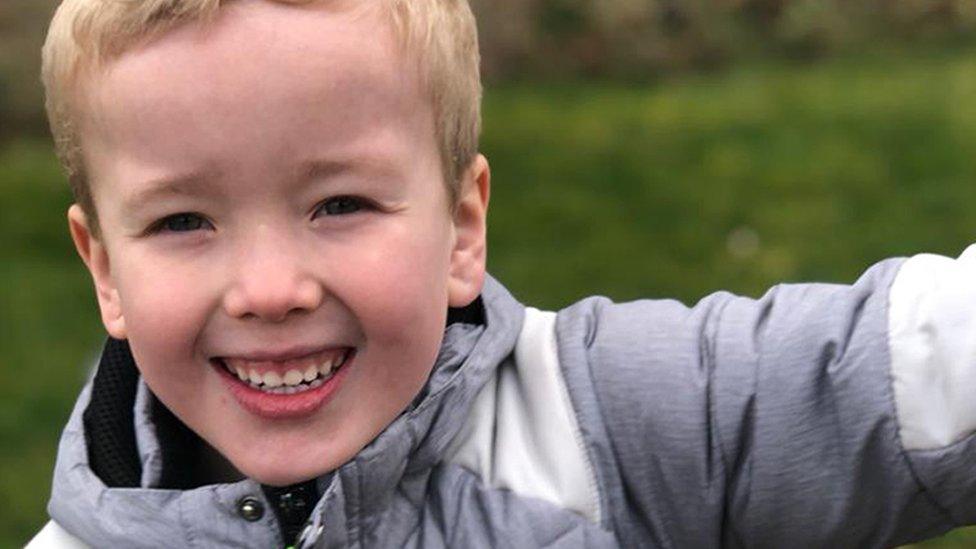Arthur Labinjo-Hughes: What were the opportunities missed to save him?
- Published

The father and stepmother of Arthur Labinjo-Hughes have been jailed after being convicted of killing the six-year-old. The circumstances leading to the boy's death will be the subject of a independent review. But it appears there were missed opportunities to save him.
Arthur's stepmother Emma Tustin, 32, has been jailed for life for his murder, and will serve a minimum term of 29 years. Her partner - Arthur's father, 29-year-old Thomas Hughes - was sentenced to 21 years for manslaughter.
Coventry Crown Court heard social workers visited Arthur's home in April 2020 after his paternal grandmother, a secondary school teacher, called an emergency number to report seeing bruises on his back.
But two months before Arthur died from a head injury, Solihull Council workers concluded he was living in a "happy household".
Social services in England have to conduct an initial assessment within 45 days of a referral and decide whether a child is in need of further support.
If they decide a child is suffering significant harm this should trigger an investigation or protective action, such as increased visits from a social worker. In the worst cases, a child can be removed from a household.
The social workers in Arthur's case found there were "no safeguarding concerns".
Solihull's Local Child Safeguarding Partnership is now carrying out an inquiry into Arthur's death.
It said his death had a "shocking impact on Arthur's family and across the whole community" and "it would be inappropriate for the partnership to comment ahead of the findings of that review".
Social services staff should have spoken to Arthur about his bruises, the Director of Association of Child Protection Professionals has said.
Wendy Thorogood told Times Radio: "I would have expected any assessment to really take account of the grandmother's photos.
"I would have expected joint conversations and real conversation with [Arthur], and that appears to have been missed," she said.
"Equally, it's a society responsibility, in relation to, his cries were so abnormal if we'd had an anonymous call from one of the neighbours that could have given them more power to do the investigation," she said.
Lord Laming led the public inquiry into the death of Victoria Climbie, who was killed by her great-aunt and her partner in 2000, and reviewed the case of baby Peter Connelly, who died in 2007 at the hands of his mother, her boyfriend and their lodger. He said the quality of training for social work "needs to be looked at again".
He told the BBC Radio 4 Today programme frontline services had become more focused on crisis rather than prevention due to a reduction in the funding of local authorities over the past decade.
He said: "The whole organisation ought to focus on the front line, on what's happening to children and making sure they intervene earlier rather than later and when it is too late."

Arthur was six years old when he died
The Independent Office of Police Conduct (IOPC) is also to publish a report into West Midlands Police's handling of the case. The trial was told one of Arthur's uncles sent the force photographs of the boy's bruises - but officers decided they had "no further role", as by that time social services had become involved.
The IOPC said it "found no indication any individual behaved in a manner that justified disciplinary proceedings".
There is also the possibility the impact of the Covid lockdown was a factor in Arthur's death. His abuse became worse at start of the first lockdown in spring 2020 - a time the NSPCC charity noted coincided with a 23% increase in calls to its helpline.
Former Children's Commissioner for England Anne Longfield told Today: "A lot of the services went on to the screens for children, and this child in particular, Arthur, wasn't in school.
"So there's a big lesson there, instantly about if there is a crisis, there are children who are going to slip from view and we have to make sure they have the protection, which does need face-to-face contact."


It is hard to comprehend the cruelty endured by Arthur in his final months. Tragically, his name now joins a list of children over the decades who have been subjected to the most appalling neglect and abuse.
Cases where there have been warnings to the authorities but the opportunity to step in has been missed.
I have reported on some of the most high profile - Victoria Climbie, external and Baby P in London, Khyra Ishaq in Birmingham and Daniel Pelka in Coventry. Names, faces and stories that stay with you.
Each involved manipulative, deceitful parents or relatives - and a child who was all but invisible when checks were made.
Arthur's stepmother and father certainly manipulated and deceived but what was different for him was lockdown. A pressure-cooker environment for families, when overstretched social workers were dealing with many calls.
Now it will be for the independent inquiry to decide whether or not the authorities could have done more to find out what life was really like for Arthur.

The number of children dying in England as a direct consequence of maltreatment has "remained relatively steady" at 28 per year - according to a government report published last year, external into 368 serious case reviews of youngsters, carried out between 2014 and 2017.
That was despite a "steady increase in child protection activity", it said.
Ms Longfield said: "For anyone who looks at the serious case reviews, or hears about them, that come after a child's death, you will see the same things coming up time and time again.
"Missed opportunities. Lack of co-ordination. Lack of data sharing. The things that professionals need to have at hand to be able to protect these children, which still aren't in place."
She said sometimes there could be high caseloads or a lack of staff experience, adding: "Certainly it is the case that the services are creaking under financial strain."
Ms Longfield questioned whether the "thresholds" for social workers to intervene remained "too high".
Boris Johnson: Tough sentences are "absolutely no consolation"
Conservative MP Tim Loughton, a former children's minister, told Today funding for children's social care had increased but demand had also risen and "it may be that the social workers here just didn't have the time to get over the threshold".
A 2010 report by Prof Eileen Munro stressed the importance of early intervention before social workers get involved.
But there is still no legal requirement on people working with children in England to report known or suspected child abuse or neglect, although there is guidance telling them to do so.
Mr Loughton, who commissioned Prof Munro's review, told Today: "We need to be doing much more. To be knocking on doors, to be snooping around where there are serious suspicions that something is going wrong.
"And for whatever reason in this case, clearly that hasn't happened."

WHAT RISK DOES AI POSE TO OUR FUTURE?: Stuart Russell explores the future of Artificial Intelligence
THE FAMOUS PHOTO OF A US PRESIDENT THAT'S ACTUALLY FAKE: How long has catfishing been around for?

- Published2 December 2021

- Published3 December 2021

- Published2 December 2021
